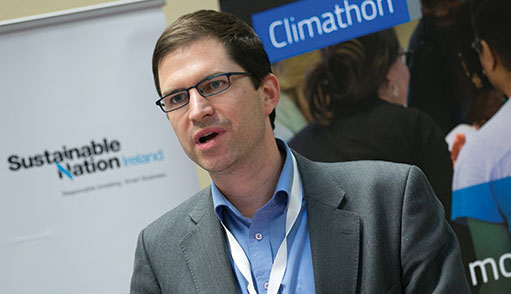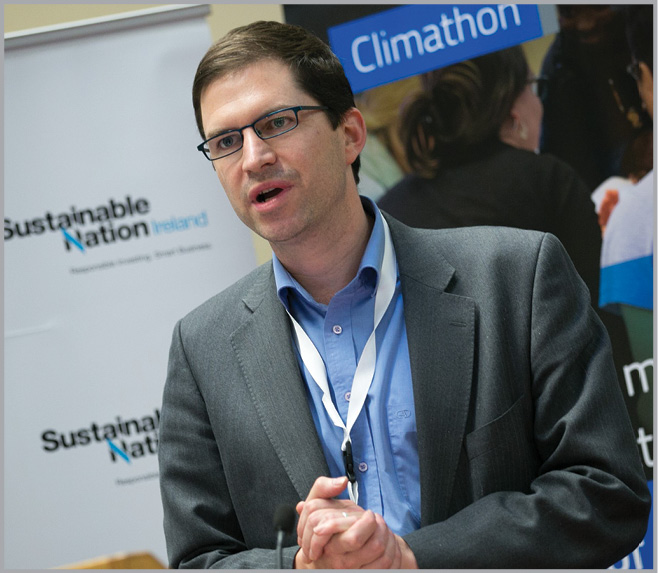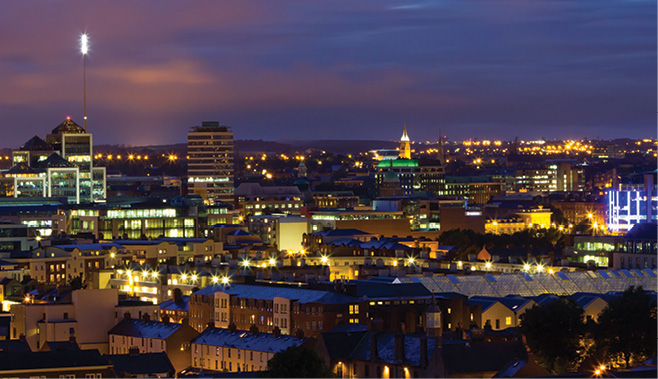Dublin: a smart city?


Smart Dublin is an initiative of the four Dublin local authorities to engage with smart technology providers, researchers and citizens to solve city challenges and improve city life. Jamie Cudden, Smart City Programme Manager with Dublin City Council writes.
Cities and governments around the world are aspiring to be ‘smart’. While there is no clear definition of a smart city there are some common threads including a focus on the increased use of sensors and instruments that allow it to be better monitored and managed in real time. A smart city is also considered as one whose economy is increasingly driven by tech inspired innovation and entrepreneurship that in turn will attract businesses and jobs, create efficiencies and raise the productivity and competitiveness of the public and private sectors. Smart cities also involve increased collaboration and engagement between the city authority, the academic and business sectors and, most importantly, citizens.
The creation of a Smart Dublin regional structure in 2016 was a step in the right direction.
We aim to position Dublin as a world leader in the development of new urban solutions, using an open data approach, and using the city as a test bed for innovation.
It’s a collaboration framework to ensure that we can take advantage of some of the big tech trends that are transforming how we live and work. The idea behind Smart Dublin is to turn key challenges into opportunities for innovation and to call out for new ideas and solutions such as the need for better mobility and transport management, response to extreme weather and flooding events, improved energy efficiency and environment, better citizen engagement and more efficient service delivery.

“Dublin is really starting to make progress on its Smart City journey however it is not without its challenges and does require high level buy in as well as strong support across Government. This will enable Dublin to deliver on its potential.”
10 examples of how Dublin is getting smarter:
1. A real game changer was the delivery of real time passenger information (RTPI) for Dublin’s public transport system, in particular on the capital’s extensive bus network – with this information now available on signage and also as a real-time data feed to your smartphone.
2. The Traffic Management Centre with its intelligent transport systems, adaptive traffic signalling, and public transport prioritisation as well as an extensive CCTV network (with over 200 networked cameras) helps to keep traffic moving across the city.
3. Croke Park (one of the largest stadiums in Europe) is also one of the world’s first carbon neutral stadiums and now the test bed for a suite of cutting edge internet of things (IoT) technologies working with companies such as Intel and Microsoft.
4. Over 400 smart bins (Big Belly compactors) were deployed across Dún Laoghaire-Rathdown resulting in a significant increase in efficiencies. These bins not only collect and compact waste with real time monitoring, but also measure environmental variables and passing pedestrian numbers. There are plans afoot to roll out up to 800 more of these bins across the city.
5. In order to respond more effectively to flooding we now have a network of sensors monitoring river levels, rainfall and local weather conditions in real time. The city is collaborating with Intel and the CONNECT research centre for future networks in TCD to deploy experimental low cost rainfall sensors. We have also experimented successfully with low cost river level monitoring sensors working with Kingspan and DCU Water Institute.
6. By opening up their data on www.dublinked.ie, the four Dublin Local Authorities invite it to be used for new applications that improve the lives of Dubliners. Dublin was one of the first cities to launch an open data platform in 2011.
7. www.dublindashboard.ie created by Maynooth University is one of the most comprehensive city dashboards providing access to thousands of interactive data visualisations. Phase 2 of the dashboard is underway and is supported through a €2 million research grant from Science Foundation Ireland.
8. Is Dublin noisy? A network of low cost and real time sound monitoring sensors developed by Dublin based Sonitus Systems lets people check the noise levels in their own neighbourhoods on www.dublincitynoise.ie.
9. Dublin’s Docklands District is the location for one of the largest development projects in Europe with over €2 billion in investment and construction projects underway. A Docklands Smart District network brings together leading tech companies (Google, Cisco, Intel, Huawei, IBM, Vodafone, and BearingPoint), research centres (CONNECT, LERO, INSIGHT) and other agencies with a focus on deploying the latest smart city innovations and connectivity across the district.
10. Dublin City Council is planning the conversion of its 45,000 street lights to low energy LED from late 2017 onwards which will go a long way towards meeting our energy and carbon emission targets while also leveraging IoT opportunities and deploying new services on top of this infrastructure.
Smart Dublin is using new ways to engage the market:
“One of the areas that we are really starting to experiment with is the concept of challenge-based procurement (using a pre-commercial procurement process). Smart Dublin’s first challenge-based innovation fund (€150,000) launched in March 2016 in partnership with Enterprise Ireland and sought smart low-cost solutions to scale up cycling in the city while addressing issues such as bicycle safety and security. This process enabled tech companies and entrepreneurs to pitch their solutions and ideas to the city council. A total of 98 companies expressed interest, with 23 proposals submitted and five companies securing initial feasibility funding of €12,500 each. Following this, four of the companies are now prototyping their solutions with €25,000 each, testing out the latest innovations in IoT to track stolen bikes, to generate real time bike journey data and also to better capture the cyclist experience. It’s important to remember that the better we can make life for cyclists, the greater the potential we have to reduce the number of cars clogging up traffic.
Three new challenges
Dublin is looking for smart low-cost solutions to tackle illegal dumping, to address flooding/blocked gullies and also to improve wayfinding across the Dublin region with up to €600,000 in funding. The winners will be selected by an open competition process run in two phases (feasibility and prototyping) with the competition open to any organisation, tech company, or entrepreneur.
Get involved and submit your proposals by 12 June 2017: www.smartdublin.ie.





